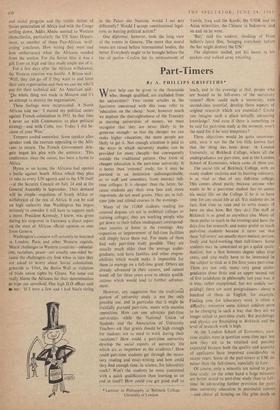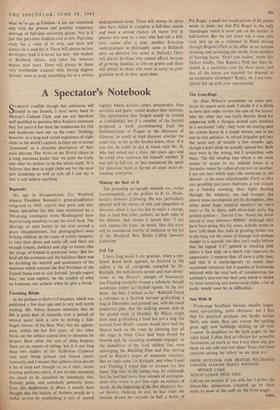Part-Timers
By A. PHILLIPS
GRIFFITHS*
WHAT help can be given to the thousands who, though qualified, are excluded from the universities? Two recent articles in the Spectator concerned with this issue refer to 'education on the cheap.' Now, however much we deplore the shortsightedness of the Treasury in starving universities of money, we must recognise that they are never likely to be generous enough: so that the cheaper we can make higher education, the more people are likely to get it. Not enough attention is paid to the ways in which university studies can be provided for more cheaply—but consequently outside the traditional pattern. One form of cheaper education is the part-time university. It is better than 'external' study, for it may be pursued in an institution indistinguishable, as to staff and amenities, from internal full- time colleges. It is cheaper than the latter, be- cause students pay their own fees and, more important, do not need grants. They are in full- time jobs and attend courses in the evenings.
Many of the 11,000 students reading for external degrees are not in technical colleges or training colleges; they are working people who get down to their (often inadequate) correspond- ence courses at home in the evenings. Any °expansion or improvement of full-time facilities will simply leave them out. For many of them find only part-time study possible. They are usually much older than the average under- graduate, and have families and other respon- sibilities which would make it impossible for them to manage on a full-time grant. Others are already advanced in their careers, and cannot break off for three years even to obtain qualifi- cations which would lead to further advance- ment.
However, any suggestion that the traditional pattern of university study is not the only possible one, and in particular that it might be fruitfully pursued part-time, meets with massive opposition. How can one advocate part-time universities while the National Union of Students and the Association of University Teachers ask that grants should be high enough for students not to need to work during their vacations? How could a part-time university develop the social aspects of university life which are _as important as the academic? How could part-time students get through the neces- sary reading and essay-writing and how could they find enough time, in science, for laboratory work? Won't the students be more concerned with a quick qualification than learning as an end in itself? How could you get good staff to
* Lecturer in Philosophy at Birkbeck College, University of London.
teach, and in the evenings at that, people \\ ho are bound to be left-overs of the university system? ,How could such a university, with second-class material, develop those aspects of original research which are essentials? Could you imagine such a place actually advancing knowledge? And even if there is something to be said for part-time study at the moment, won't the need for it be very temporary?
These objections would be quite, unanswer- able, were it not for the too little known fact that the thing has been done: in London University, at Birkbeck College, where all the undergraduates are part-time, and at the London School of Economics, where some of them arc.
The social life of Birkbeck College, with its many student societies and its buzzing refectory, is as vital as that of any full-time college. This conies about partly because anyone who wants to be a part-time student has to centre his social life on the College if he is to have time for any social life at all. Yet students do. in fact, find time to read and to write essays. (I have no idea how. But they do.) The staff at Birkbeck is as good as anywhere else. Many of them prefer to teach in the evenings and have the days free for research; and many prefer to teach part-time students because it turns out that these 'left-overs' are usually more mature, serious, lively and hard-working than full-timers. Some students may be concerned to get a quick quali- fication; but a first honours degree takes four years, and you really have to be interested in the subject to stick at it for four years part-time. There are not only many very good under- graduates (four firsts and an upper second out of five candidates in philosophy last year was, it is true, rather exceptional, but not unduly sur- prising); there are most postgraduates—about a hundred of them in English, for example. Finding time for laboratory work is often a difficulty; moreover some science subjects seem to be changing in such a way that they are no longer suited to part-time study. But psychology and physics are flourishing at Birkbeck and the level of research work is high.
At the London School of Economics, part- time studies were in question some time ago; but now they are to be retained and possibly expanded because both the quality and quantity of applicants have improved considerably in recent years. Some of the part-timers at LSE do better than the full-timers, especially in Law.
Of course, only a minority are suited to part- time study; on the other hand a large minority are better suited to part-time study than to full- time. In advocating further provision for part- time university education in provincial centres —and above all hanging on like grim death to
what we've got in London—I am not concerned only with the present and possibly temporary shortage of full-time university places. Nor is it just that part-time students cost us less. Part-time study has a value of its own, and there will always be a need for it. There will always be late developers (and it is never too late: one student at Birkbeck retires, and takes his honours degree, next year). There will always be those very worthwhile students who, having degrees already, want to study something else at a serious
undergraduate level. There will always be those who have failed to complete a full-time course and want a second chance. (A recent first in physics was won by a man who had left a full- time course after a year; another first-class undergraduate in philosophy came to Birkbeck after an abortive two terms at Oxford.) There will always be those who cannot afford, because of growing families, to live on grants and there will always be those who want to carry on post- graduate work in their spare time.































 Previous page
Previous page